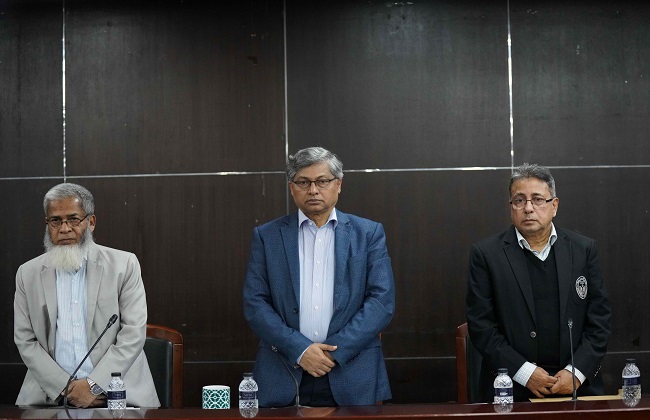
North South University (NSU) marked the Martyred Intellectuals Day of 2024 with a series of poignant events and reflective seminars, paying homage to the intellectuals who sacrificed their lives during Bangladesh’s fight for independence on 15 December.
A delegation from North South University formally honored the martyred intellectuals by placing a wreath at the Martyred Intellectuals Memorial in Rayer Bazar, Dhanmondi. The ceremony was attended by NSU’s administrative and academic heads, faculty members, university officials, and representatives of the student clubs.
In the afternoon, the focus shifted to an insightful seminar at the Syndicate Hall, NSU. Dr. A.K.M. Atiqur Rahman, Professor and Director of Economics Research, graced the seminar as Keynote Speaker. Professor Abdul Hannan Chowdhury, Vice-Chancellor of NSU, chaired the session.
The event began with a recitation from the Holy Quran, followed by a minute of silence to honor the memory of the martyrs. Professor Abdur Rob Khan, Treasurer and Pro-Vice-Chancellor (IC), welcomed the attendees with an opening address. He remarked, “On this day, I solemnly recall with deep respect all the intellectuals who were killed by the collaborators of the Pakistani occupation. Let us honor their sacrifice by building a Bangladesh rooted in the ideals they believed.”
Dr. A.K.M. Atiqur Rahman stated, “Since the creation of Pakistan, individuals who participated in various movements—the independence movement, the language movement, and those who embraced free-thinking or had the ability to lead an independent Bangladesh—were systematically identified and killed. It wasn’t just death; it was sheer brutality.”
He also said, “We need to work harder to fulfil the dreams of the martyred intellectuals. Our goal should be to ensure social justice and create a fair society without exploitation, where everyone has equal opportunities and economic balance is achieved.”
Professor Abdul Hannan Chowdhury said, “Before the victory, the final killing mission carried out by the enemy was intended to ensure that even if this nation became independent, it would not flourish intellectually or meritocratically. That was the ultimate loss we experienced, and it is a loss that this nation continues to suffer from in many ways.
He added, “If we look at the July uprising, it becomes evident that we still struggle as a nation. Why does it take 10 or 15 years to topple a brutal government? The reason lies in the long-term effects of that loss—the damage inflicted on our intellectual foundation. The intellectuals who could have guided this nation were taken from us, leaving us weaker and less capable of challenging autocratic and fascist regimes effectively.”


